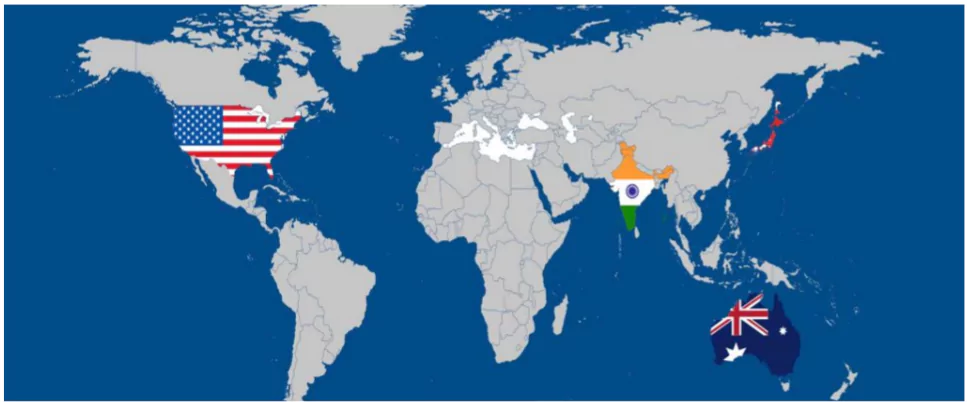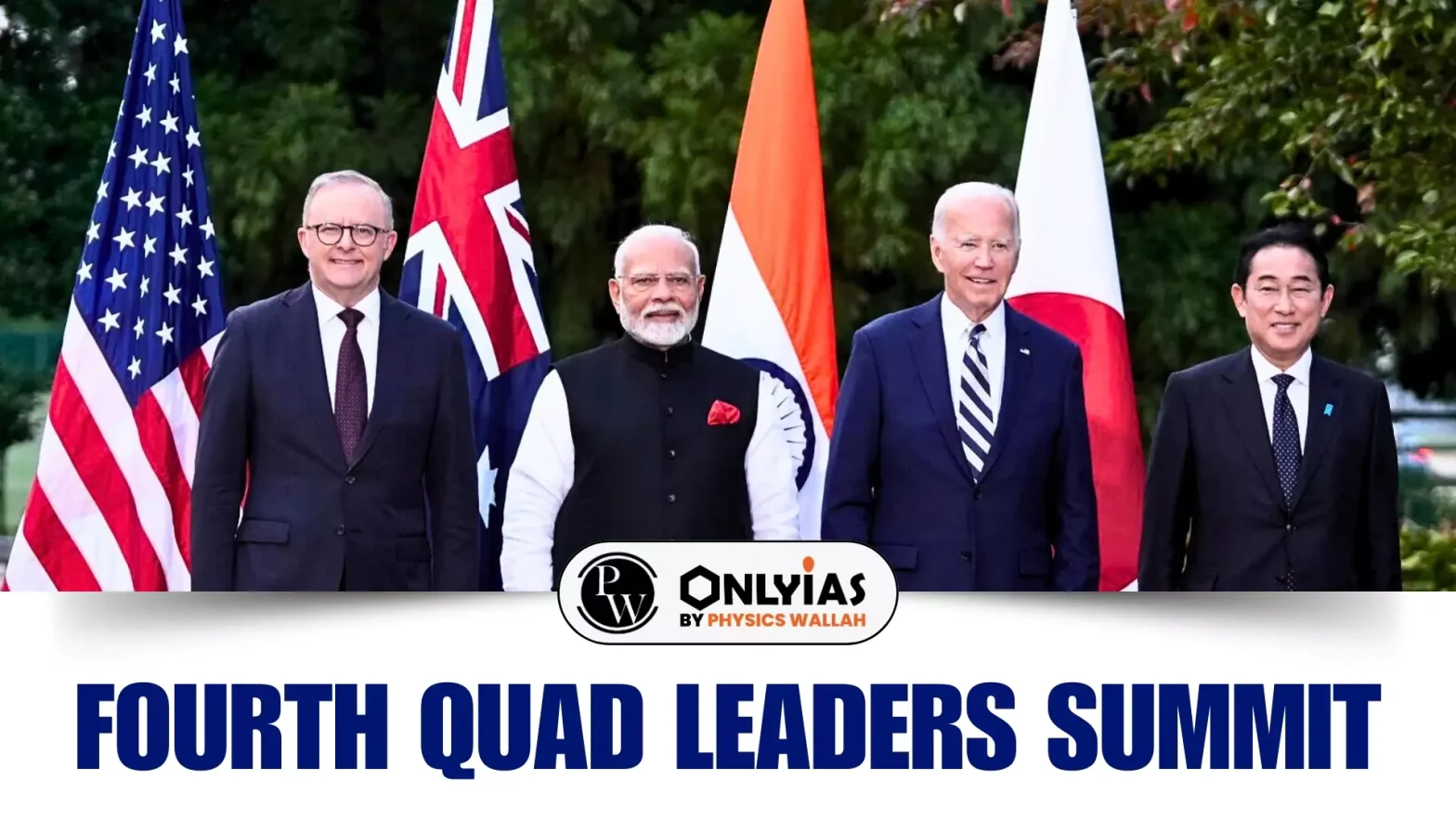Prime Minister Narendra Modi participated in the fourth Quad Leaders Summit which was held in Wilmington, Delaware on September 21 2024.
- Indian Prime Minister joined President Biden (USA), Prime Minister Albanese (Australia) and Prime Minister Kishida (Japan) for the Quad Summit.
Key Announcements From the fourth Quad Leaders Summit
- The QUAD 2025 Summit: India will host the 2025 Quad Leaders Summit and The United States will host the 2025 Quad Foreign Ministers Meeting.
- The QUAD Wilmington Declaration:
- The Joint Statement reiterated the group nature as “a force for good” and signalled that it is now more strategically aligned than ever to deliver real, positive, and enduring impact for the Indo-Pacific Region.
- Peace and Security: The Group vouch for the maintenance of peace and stability across the Indo-Pacific Region as an indispensable element of global security and prosperity
- The QUAD opposes any destabilising or unilateral actions that seek to change the status quo by force or coercion
- The Group condemned the recent illicit missile launches in the region and expressed serious concern over aggressions in the Indo-Pacific.
- Quad Caucus: The USA Members of Congress announced the creation of a bipartisan, bicameral Congressional Quad Caucus as the Quad countries have decided to work with their respective legislatures to deepen inter-parliamentary exchanges.
Enroll now for UPSC Online Course
- Expansion: The Quad networking will expand to include the Commerce and Industry ministers meeting for the first time.
- Initiatives Under The Quad Health Security Partnership:
- Quad Cancer Moonshot: It is a collective effort to realise public and private resources to reduce the number of lives lost to cancer in the Indo-Pacific, with an initial focus on cervical cancer.
- Pandemic Preparedness: Quad plans to coordinate its efforts to promote equitable access to safe, effective, quality-assured vaccines, including to try and expand vaccine manufacturing in low and middle-income countries.
- India will host a workshop on pandemic preparedness and release a white paper outlining emergency public health responses.
- Australia will increase the pool of deployable public health specialists in response to disease outbreaks, with the first training session scheduled to commence in Darwin, Australia.
- The United States is pledging over $84.5 million to partner with fourteen countries in the Indo-Pacific region to strengthen capacity to prevent, detect, and respond to infectious disease threats.
- Maritime Security:
- Maritime Initiative for Training in the Indo-Pacific (MAITRI): It has been announced to enable the Indo-Pacific regions partners to maximize tools provided through Indo-Pacific Partnership for Maritime Domain Awareness (IPMDA) and to monitor and secure their waters, enforce their laws, and deter unlawful behavior.
- India will host the inaugural MAITRI workshop in 2025.
- Indo-Pacific Logistics Network: A pilot project has been launched to pursue shared airlift capacity and leverage collective logistics strengths to support civilian response to natural disasters more rapidly and efficiently across the Indo-Pacific region.
- Quad-at-Sea Ship Observer Mission in 2025: The Coast Guards of the 4 countries are planning to launch their first-ever Quad-at-Sea Ship Observer Mission in 2025 in the Indo-Pacific to improve interoperability.
- The Quad Ports of the Future Partnership: The inaugural Regional Ports and Transportation Conference will be hosted by India in Mumbai in 2025 and aims to harness the Quad’s expertise to support sustainable and resilient port infrastructure development across the Indo-Pacific.
- Climate and Clean Energy:
- Solar projects: India has pledged an investment of around $2 million in new solar projects in Fiji, Comoros, Madagascar, and Seychelles.
- Quad Clean Energy Supply Chains Diversification Program: The Programme will support projects which develop and diversify solar panel, hydrogen electrolyzer and battery supply chains.
- AI and Technology: The United States plans to invest over $7 million to support the global expansion of Asia Open RAN Academy (AORA), by partnering with Indian institutions for training projects.
About The Quadrilateral Security Dialogue (QUAD)
- The Quad is a diplomatic and Informal partnership between Australia, India, Japan, and the United States committed to supporting an open, stable and prosperous Indo-Pacific that is inclusive and resilient.
 Quad partners engage regularly through Leaders Summit , Foreign Ministers, Quad Sherpas, senior officials, and experts.
Quad partners engage regularly through Leaders Summit , Foreign Ministers, Quad Sherpas, senior officials, and experts.
- Origins: It dates back to the collaboration between the 4 countries on disaster relief efforts in response to the December 2004 Indian Ocean tsunami.
- 2007: The PM of Japan, Shinzo Abe, formalised the alliance, as the Quadrilateral Security Dialogue or the Quad.
- 2017: The QUAD was revived with the focus shifting to the Indo-Pacific region to counter China’s growing assertiveness there. Over the years, the Quad has formed multiple working groups.
- 2020: Australia joined the trilateral India-US-Japan Malabar naval exercises, marking the first official grouping of the Quad since 2017, and the first joint military exercises among the four countries in over a decade.
- 2021: A joint statement titled ‘The Spirit of the Quad,’ outlining the group’s approach and objectives was released in a virtual leaders summit.
- The first in-person meeting was held in Washington DC, later that year.
- Informal Nature of the Organisation:
- Lacks Governing Bodies: The QUAD doesn’t host a secretariat or any permanent decision-making body like the EU or UN, instead focuses on expanding existing agreements.
- The Objective: The group primarily focuses on maritime security, rules-based global order, freedom of navigation and a liberal trading system. The coalition also aims to offer alternative debt financing for nations in the Indo-Pacific region.
- QUAD+: The QUAD grouping could also undergo expansion through a QUAD Plus Framework including countries like South Korea, New Zealand, and Vietnam, amongst others.
Significance
- To Secure Sea Routes of Communication: QUAD has emerged as a new strategy to keep the critical sea routes in the resource-rich Indo-Pacific, free of any influence, amidst China’s growing military presence in the strategic region.
- Contain China: QUAD can strategically counter China’s economic and military coercion as India can take the support of the other Quad nations in the event of Chinese belligerence on its border or naval front and can also conduct strategic explorations in the Indo-Pacific region.
- Multilateral engagement: India recently has adopted the strategy of Multi- Alignment from Non-Alignment presenting an opportunity to work multilaterally on all kinds of initiatives that can help create, a free and open Indo Pacific region.
- Make a presence in Indo- Pacific: India through engagement with QUAD countries can make inroads in the political landscape of the Indo- Pacific area expanding its Trade prospects, security role, overall global standing.
Check Out UPSC CSE Books From PW Store
Challenges
- India’s Suitability and Reliability as a QUAD Partner: India’s strong ties with Russia and hesitation on data sharing, citing strategic autonomy, have raised concerns on India’s suitability in the grouping.
- Threat of China: QUAD’s formation in the wake of China’s subversion of the international order and attempts to flout the rules based order is still on weak ground as all the countries still maintain a handsome trade relation with the country which does not allow escalation of conflict.
- Less Institutionalisation: The QUAD being an informal alliance has seen some procedural difficulties in realising its various initiatives, Thus an effective Working Group or a Formalisation of the grouping should be the next step forward .
- Maritime Dominated: QUAD main focus is to maintain Maritime Security in the Indo-Pacific which aligns with the security objectives of US, Japan And Australia but doesn’t fully aligns with India’s security concerns, which is the only country to have a land border dispute with China.
- Missing Collective Progress: QUAD lacks effective implementation mechanisms as it is an issue-specific partnerships with shared interests and security concerns, but sometimes the national interests and priorities of individual countries takes precedence over the QUAD’s vision resulting in poor execution efforts.
- Example: India- Russia Relations
- Maintaining Strategic Autonomy: India, unlike Japan and Australia, is not an ally of the US and emphasises its strategic autonomy often by taking a different stand on important issues from the other QUAD members making it an Outlier
- Diverging Strategic Focus within the Quad: India’s strategic focus differs from its Quad partners. While the US and its allies prioritize East Asia and the Western Pacific, India’s challenges lie in South Asia and the Indian Ocean, where it faces the China-Pakistan threat with limited support from Quad members.
Way Forward
- Formalise the Governing Structure: The QUAD should establish a governing body consisting of a rotating chair and secretariat, bound by some legal framework to guide the implementation process and hold member nations accountable for progress while keeping the ad hoc and flexible nature of QUAD as it is.
- Narrow down the Expansion: The QUAD Countries should prioritise on the scale and scope of projects being undertaken based on their specific capability so as to delegate funds and resources in a rational way.
- Improve Credibility: The QUAD countries need to collaborate on information and intelligence sharing through adopting strict information-sharing protocols, so as to uplift each other’s capability and build trust in each other.
Enroll now for UPSC Online Classes
![]() 23 Sep 2024
23 Sep 2024

 Quad partners engage regularly through Leaders Summit , Foreign Ministers, Quad Sherpas, senior officials, and experts.
Quad partners engage regularly through Leaders Summit , Foreign Ministers, Quad Sherpas, senior officials, and experts.